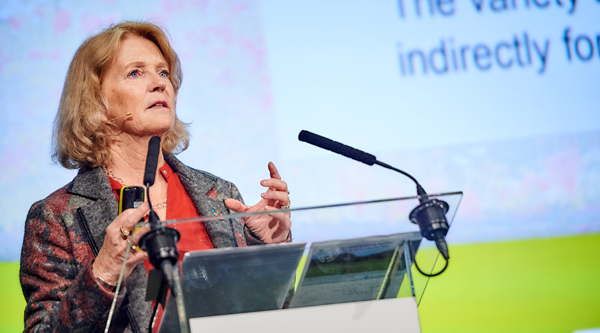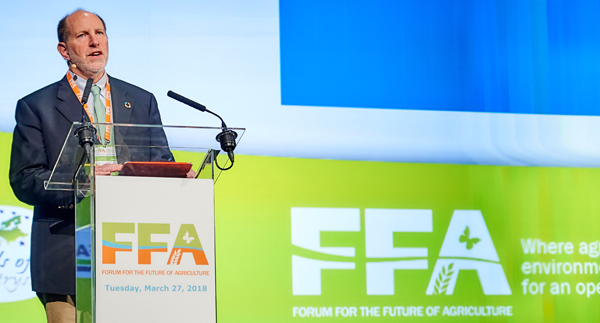2018 post-event blog 4:
Healthy environment: Synergistic management of agricultural and natural systems
Thursday, Apr 19, 2018
Opening session 2 at FFA2018, Gary Tabor, Founder & Executive Director, Centre for Large Landscape Conservation, showed participants a map of the world’s first national park. Started in 1872, Yellowstone in the US became a cornerstone of conservation policy, but the park borders basically constitute a four-sided box. “Nature cannot be contained by such limited cubical patterns of thinking,” he insisted, illustrating how elk migrated in different directions into and out of the park. “If you can’t move, you can’t live.”
He called for a change in the way conservation is approached, moving from the 20th century ecosystem concept to “process conservation” today. This aims to conserve the myriad of processes that sustain nature. Connectivity can help achieve this by creating conservation networks between protected areas. “Connected parks are more effective in conserving biodiversity. Isolated parks lose species,” he said, adding: “This means we have to be smarter about conserving nature outside parks.”
One of the greatest threats to this connectivity is fragmentation from “the current tsunami of linear infrastructure”. This undermines nature and the ecological services that support agriculture. Roads, railways and pipelines are being built in “high biodiversity regions without environmental review”, he said, pointing out that paved roads in the world will double in the next 30 years, depriving nature of space.
Mr Tabor offered a way ahead to overcome the challenges: marry precision farming and precision conservation, decrease food waste, promote smarter diets, and integrate agriculture and conservation within a landscape context.
Ann Tutwiler, Director General, Bioversity International, the second keynote speaker, focussed on agricultural biodiversity. She described this as “every living system that we need to help us produce food”.
In the last century, the target was to defeat famine, particularly in India, China, Western Africa and Central Africa, by increasing calories and yields. “We did a good job. The challenges for us now are very different,” she said, pointing out that poor diets – what we eat and don’t eat – are now the number one health risk. Food systems account for 27% of world risks, compared to 16% for unsafe sex, alcohol, drugs and tobacco use combined, she explained.
Climate change will force farmers across the world to adapt in different ways to their changing environment. Yet at the same time, agricultural production is becoming more homogenous. A recent UK Kew Gardens study identified 5,538 crops humans have eaten throughout history. Now, just three (rice, maize and wheat) account for over 50% of calories and another 12, along with five animal species, provide 75% of the world’s food. “What is happening is that we are losing solutions to improve our diet, our resilience and help farmers adapt to climate change,” she pointed out. She cited a recent World Economic Forum report. Global leaders consider between six and eight high impact risks are directly related to current food and farming systems. To reduce the risks, they proposed more diversification.
She rejected the notion, supported by some, that wild biodiversity and agrobiodiversity, which face many of the same threats and challenges, are opposed to each other. “I would argue a diversified agricultural system can actually contribute to higher levels of wild biodiversity and to conservation strategy,” she told the audience, stressing the need for better integration between wild and agrobiodiversity.
To watch videos from FFA2018 click here >



